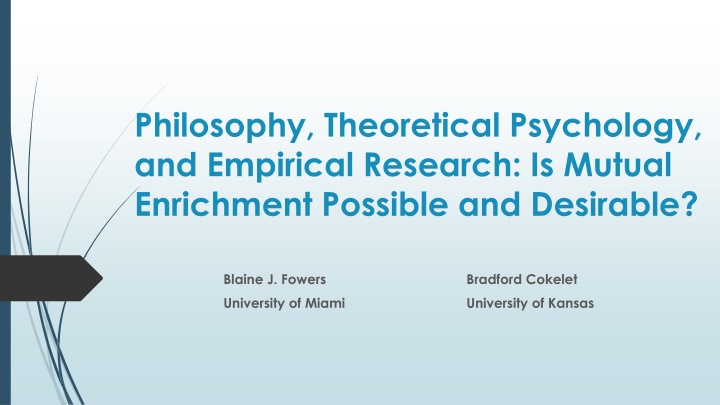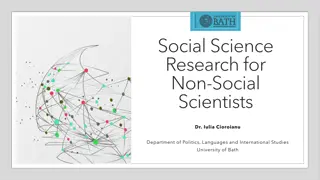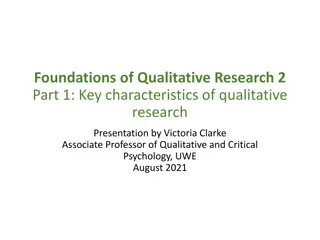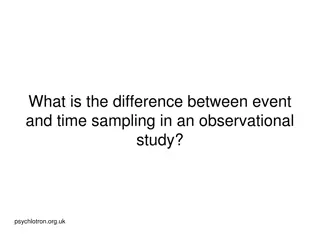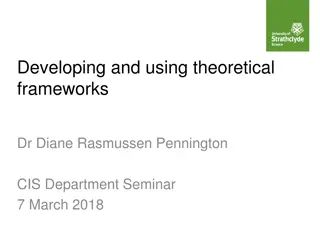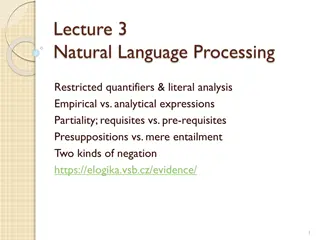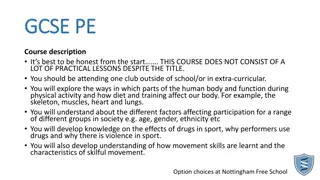The Interplay Between Theoretical Psychology and Empirical Research
Exploring the potential for collaboration between philosophy, theoretical psychology, and empirical research, this article delves into the historical divide, recent renaissance, and avenues for mutual enrichment. It raises questions about how each discipline can contribute to and benefit from the others, emphasizing the importance of integrating philosophical accounts with empirical evidence for concrete and psychologically realistic outcomes.
Download Presentation

Please find below an Image/Link to download the presentation.
The content on the website is provided AS IS for your information and personal use only. It may not be sold, licensed, or shared on other websites without obtaining consent from the author.If you encounter any issues during the download, it is possible that the publisher has removed the file from their server.
You are allowed to download the files provided on this website for personal or commercial use, subject to the condition that they are used lawfully. All files are the property of their respective owners.
The content on the website is provided AS IS for your information and personal use only. It may not be sold, licensed, or shared on other websites without obtaining consent from the author.
E N D
Presentation Transcript
Philosophy, Theoretical Psychology, and Empirical Research: Is Mutual Enrichment Possible and Desirable? Blaine J. Fowers Bradford Cokelet University of Miami University of Kansas
Philosophers and Psychologists Long history of non-collaboration Recent revival Philosophical interest in psychological realism Experimental philosophy Deep integration projects Collaboration domains Cognitive science Moral psychology Evolutionary science Consciousness studies
Questions of the Day How can philosophers contribute to theoretical psychology? How can theoretical psychology contribute to the growing interest in making philosophical accounts more psychologically realistic? How can philosophical accounts contribute to conceptual improvements in empirical research? Can empirical research contribute to rendering philosophical accounts more concrete and psychologically realistic? Can theoretical psychologists recognize legitimate and important empirical questions in our areas of interest?
Is There a Place for Empirical Evidence in Theoretical Psychology? Blaine J. Fowers, Ph.D. Department of Psychology University of Miami
Theoretical Psychology and Empirical Questions Longstanding antagonism Self-marginalization All empiricism vs. anti-empiricism Critique without remedies Lack of serious engagement Two avenues for improvement How can theoretical psychology enhance empirical psychology? How can theoretical psychology benefit from empirical psychology?
Theoretical Psychologys Contributions to Empirical Psychology Theoretical enrichments Empirical virtue research Single time-point, global measures Inadequate method Inadequate theory Methods remedies Experience sampling methods Density distribution models Meindl et al., 2013 Bleidorn & Denisson, 2015
Enhancing Empirical Research Virtue theory Cultivated disposition/habit Behavior Emotion/motivation Cognition Practical wisdom Multicomponent measurement Conceptual analysis of constructs and measures
Inadequacies of Situationist Research Enormous experimental social psychology literatures Doris: Lack of Character Meta-analysis of helping literature Nascent justice literature Methods remedy Theoretical remedy Cleaner test Multicomponent measurement Conceptual analysis of constructs and items
Empirical Contributions to Theoretical Psychology Checking meta-theoretical complaisance Concretize abstract concepts into psychologically realistic constructs Require nuance in overly pat formulations Resistance of the empirical world is often instructive Best evidence can improve confidence in theory and meta-theory
Acknowledgement This work was funded by a grant from the Self, Motivation, and Virtue Project at the University of Oklahoma, which was funded by the Templeton Religion Trust.
Some Benefits of Interdisciplinary Friendship Bradford Cokelet, Ph.D. Department of Philosophy University of Kansas
Three Models for Philosophic Psychological Integration 1) Psychology as Empirical Reality Check 2) Psychology as Middleman (gateway to Policy Impact) 3) Integration of Research How can we do this? What are the benefits?
Psychological Realism: Psychology as Empirical Rail- guard Philosophy What is justice? Why act justly? Why cultivate the trait of justice? Psychology How Just are people? How Just can People be? What social, situational, and individual factors impact Justice?
From Philosophy to Social Policy: Psychology as Mediator Philosophy What is Welfare? What is Happiness? How Ethically Important are Welfare/Happiness? Psychology What add or detracts from Welfare? How can we measure Welfare? How can we evaluate and and improve institutions, etc.
What is justice? Which questions should we ask? How should we interpret narratives? With what can Justice be confused? What are the aspects/compone nts of Justice?
Acknowledgement This work was funded by a grant from the Self, Motivation, and Virtue Project at the University of Oklahoma, which was funded by the Templeton Religion Trust.
